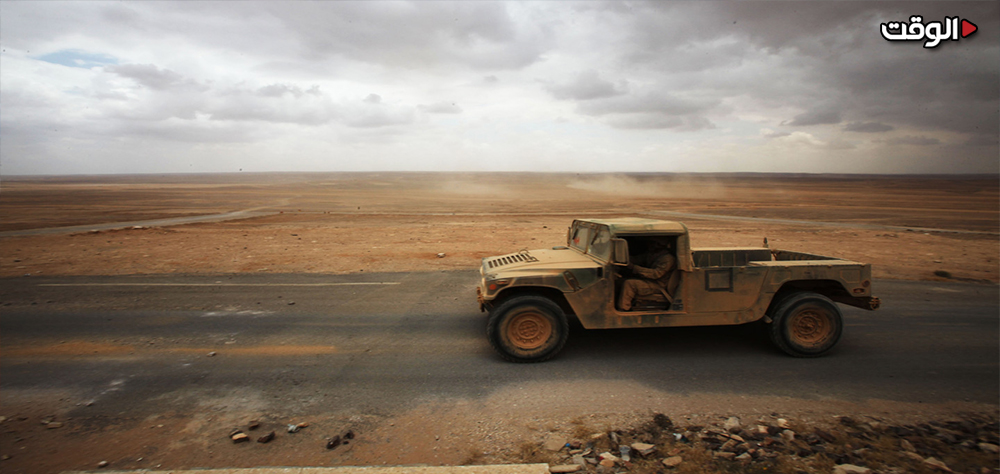The American base targeted by a drone attack in Jordan serves as a crucial stronghold for US forces along the Baghdad-Damascus corridor, monitoring resistance movements between Iraq and Syria. Hence, the assault reflects the dissatisfaction of resistance factions regarding Jordan's hosting of American military forces.
ALWAGHT- Recently, the desolate deserts of Jordan have experienced one of their worst nightmares: the death of American forces at a military base located on the Jordan-Syria border.
Around two weeks ago, on January 28th, an unmanned combat aerial vehicle successfully infiltrated a United States military facility named Tower 22 along the Jordan-Syria border under the shroud of darkness. This drone evaded sophisticated American aerial defense systems, resulting in the deaths of three American soldiers and the injury of numerous others.
In the immediate aftermath, Iraqi Islamic resistance factions, typically represented by groups like Kata'ib Hezbollah and Al-Nujaba, claimed responsibility for the assault. They framed the attack as a retaliation for America's backing of Israel's military actions in Gaza.
Although regional resistance factions operate independently, the United States consistently links the attacks to Iran. Tehran has repeatedly denied these allegations, yet tensions between Tehran and Washington have escalated.
Message to Jordan
According to some analysts, the assault on the American base in Jordan holds significant implications for various stakeholders. Merissa Khurma, an analyst associated with the Wilson Center, conveyed to New Arab that while resistance group attacks primarily target US presence, this incident also conveys a message to Jordan. This recent attack on US forces marks the first such assault in the country since the Gaza War. Over the years, the Jordanian monarchy has fostered strong relations with the US and the West, portraying itself as a safe haven for American military personnel. Nonetheless, the recent attack underscores a shift, suggesting that Jordan is no longer seen as a secure outpost for Western and American forces, compelling the Jordanian government to confront this new reality.
The American base under attack in Jordan, strategically positioned along the Baghdad-Damascus corridor, monitors the movements of resistance groups between Iraq and Syria. Consequently, this base isn't viewed favorably by regional resistance forces, and the recent attack signals their dissatisfaction with the American military presence on Jordanian territory.
Abdullah Hayek, a Jordanian analyst based in Washington, shares the view that resistance groups have significantly expanded their influence in Iraq and Syria in recent years. It appears that following Iraq and Syria, Jordan is now in the crosshairs of resistance forces in their campaign against American forces.
The resentment among Jordanians regarding the presence of American military forces
In the midst of this, Jordanians harbor deep resentment toward the ongoing atrocities committed by the Zionist regime of Israel in the Gaza War, now in its fourth month. This anger is primarily aimed at the United States, Israel's main military sponsor. Annually, the US allocates over $3.8 billion in military aid to Israel. Since the onset of Israel's air and ground offensive in Gaza, resulting in over 28,000 deaths, the US has pledged billions more in military assistance to Israel. Notably, around 60% of Jordan's population trace their origins back to Palestine.
Recently, Murad Adaileh, Secretary-General of the Islamic Action Front Party (IAF), the political arm of the Muslim Brotherhood in Jordan, asserted that the US provides unwavering support for the Zionist regime's crimes. These remarks underscore the mounting anger among Jordanians toward the US presence. Concurrently, anti-American sentiments are on the rise in Jordan, with groups like the Muslim Brotherhood experiencing unprecedented popularity. While many Jordanians criticize the monarchy for its ongoing collaboration with the US and Israel.
In the aftermath of the recent drone attack by Iraqi Islamic resistance forces on Jordanian territory, Jordanian lawmakers have demanded an inquiry into the presence of American military forces in the country. This represents the most conspicuous indication yet of the growing public dissatisfaction in Jordan with the US military presence.
In 2021, Jordan entered into a defense agreement with the United States, allowing unhindered access for American forces, aircraft, and vehicles to the kingdom's territory for training and counterterrorism collaboration. In exchange, Jordan receives $425 million in military aid annually. It's noteworthy that this agreement was endorsed through an extraordinary measure outside of parliamentary proceedings, via royal declaration, rather than through parliamentary representatives.
Furthermore, there have been reports of Jordan's participation in US airstrikes in Iraq as a response to attacks on American forces in Jordan. This development has stoked Iraqi resentment to the point where a member of the Iraqi parliament has proposed halting oil exports to Jordan. Consequently, the presence of the United States in Jordan is now met with dissatisfaction and anger among the Jordanian population, indicating that the United States has become a source of turmoil for Jordanians.
The new landscape of tension in the region
The drone strike on American soldiers in Jordan signals the onset of instability in the country. It seems that the instability observed in specific areas of Syria and Iraq due to the presence of American troops is now extending to Jordan. According to the Jordanian analyst Amer Sabaileh, the recent drone attack on Jordanian territory signifies the expansion of anti-American activities into the "geography of Jordan."
Jordan holds strategic significance as one of the key regions in the Middle East today, where resistance groups have opted to challenge the United States.
The utilization of Jordan's airspace and borders for drone attacks against American bases places Jordan in a delicate situation jeopardizing its security ties with the United States and Israel. This could potentially cast doubt on previous security pacts with Washington. Consequently, the Hashemite Kingdom of Jordan is likely to face conflicting pressures: opposition from the public against American presence and pressure from Washington aiming to solidify its foothold in the Jordanian deserts.



























